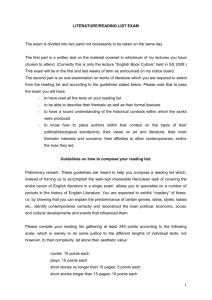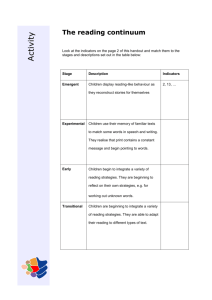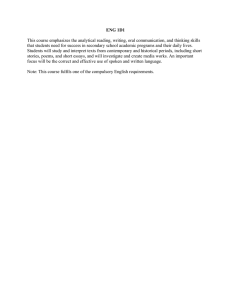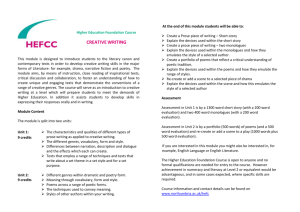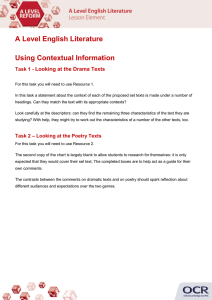Using contextual information at A Level - Activity - Lesson element (DOCX, 151KB)
advertisement
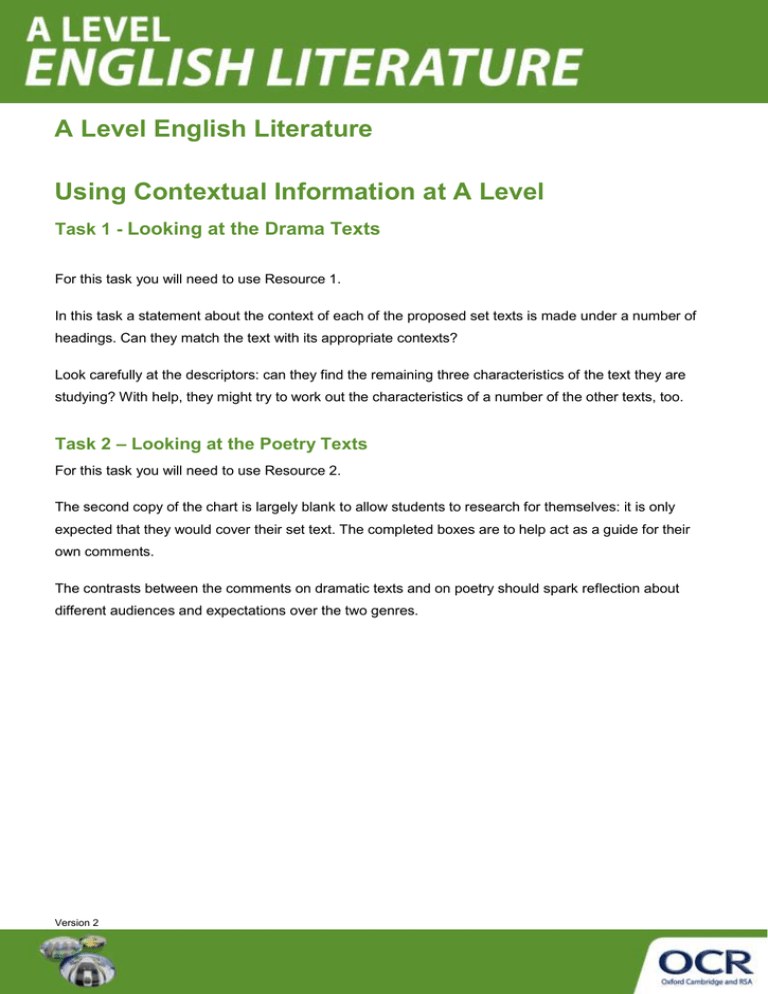
A Level English Literature Using Contextual Information at A Level Task 1 - Looking at the Drama Texts For this task you will need to use Resource 1. In this task a statement about the context of each of the proposed set texts is made under a number of headings. Can they match the text with its appropriate contexts? Look carefully at the descriptors: can they find the remaining three characteristics of the text they are studying? With help, they might try to work out the characteristics of a number of the other texts, too. Task 2 – Looking at the Poetry Texts For this task you will need to use Resource 2. The second copy of the chart is largely blank to allow students to research for themselves: it is only expected that they would cover their set text. The completed boxes are to help act as a guide for their own comments. The contrasts between the comments on dramatic texts and on poetry should spark reflection about different audiences and expectations over the two genres. Version 2 Resource 1 Social context Theatrical Context Biographical/ Authorial Context A picture of a society Performed in The author is a socialite where respectability commercial theatres and ‘wit’: fascinated by and legal responsibility with realistic scenery social behaviour and Marlowe’s EDWARD II create a sense of representing specific ingenious in using Written in a society claustrophobia: middle- places, which are conversation to both interested in the class concerns underly described in some reveal and hide spectacles of human the sense of status detail in the text. There motivation. Under the weakness, and in being gained by painful is a sense of direct ‘social’ surface, though, politics and power, but hard work and moral appeal to the lies a darker and deeper in which these things correctness. Under this audience’s judgement, concern with hypocrisy are safer discussed as a male-dominated and that the success or and double standards: the ‘historical’ record - to surface lie real feelings failure of plays - author was arrested and discuss the behaviour of and dilemmas which whether they are a ‘hit’, imprisoned during the Monarchs publicly may are never fully really matters play’s run, and the cast well be dangerous articulated: where gave evidence against individuals are never him Political Context allowed to develop as individuals A Version 2 a 1 Webster’s DUCHESS This audience values Highly realistic, elegant The author is interested in OF MALFI style and wit above settings, reflecting the power and corruption, and Written for and in a almost everything: lives and tastes of the is inclined to shock. He society fascinated by well-turned remarks, wealthy: a sense of enjoys the macabre. He plotting and political witty or cynical, are display and self- looks hard at the human intrigue, where central to most conscious elegance and personal implications Catholicism is regarded characters’ appeal. reflected in interiors, of inherited power and as dangerous (though Under the surface, manners, dress and wealth, and at the darker some of the audience though, there are hints language. High sides of family may be secret of dark secrecy and emotional tension, relationships. He seems Catholics) and power is corruption, and a centering on to have been a lawyer by seen as corrupting: concern with the social revelations and dark training. He represents some aspects of the role of women secrets, gives a Mediterranean countries play may be felt to powerful shape to as deeply corrupted reflect aspects of events contemporary court life, but are ‘neutralised’ by a Mediterranean setting Version 2 B b 2 Goldsmith’s SHE Written to be enjoyed STOOPS TO in a commercial theatre most often in smaller, tragedies and historical CONQUER which is concerned private candlelit plays, based on recently Written for a society in with fashion and theatres before a published history books: which the aristocracy ‘manners’: highly alert middle-class and he is a brilliant user of and middle classes to the distinctions of aristocratic audience, poetic rhythm, and is attend the theatre for country and town, and though perhaps also exploring new ways of fun: they are interested with the social performed outdoors in looking at power and in polite (and impolite) manners of each. This the bigger playhouses: human motivation. He is social behaviour, and society is highly does not demand interested in some they enjoy the spectacle concerned with social highly specific aspects of sexual of human fallibility, and status and income, and locations, though ambiguity: he is also enjoy fun being made of sees marriage as enclosed chambers, suspected to have been a idiosyncratic behaviour bound up in this darkness and spy Probably performed The author writes eavesdropping figure largely: a sense of the ‘sinister’ prevails C Version 2 c 3 Wilde’s AN IDEAL Written to be seen by Highly realistic, spare The author was born into HUSBAND literate middle class staging, representing a respectable merchant Written in a society which and aristocratic the precise social family, but his father’s has a highly developed audiences who may respectability and financial ruin showed him, sense of social style and ‘decode’ references to status of the through his mother, manners: it is fascinated contemporary political protagonists: the womens’ capacity for by social status and corruption: an smallest details of set selfless suffering. His moral responsibility: audience which is well- design (letterboxes, plays are often attacks on power and wealth may read and interested by furnishings) have a the moral values of the be inherited or gained by ideas of corruption and direct relationship to society in which he lived other means. Concerned loyalty, and which finds the plot with appearances and ‘dark passion’ among reality: with the gap ‘the great’ intriguing between peoples’ professed views and their actual behaviour Version 2 D d 4 Ibsen’s A DOLL’S Written to be received Performed sometimes The author is concerned HOUSE in a public theatre before a closed, select to write a comic play Written in a society which admits people of audience in private, but which will be a ‘hit’ - he is concerned, above all, all ranks: all members more often, quite making fun of conceit, with social status and of audiences may not spectacularly, on big, and looking at the ways in respectability, and in necessarily be able to public open stages which ‘town’ and ‘country’ which men hold all the read. The audience which are being built manners conflict. He is power in the household has a growing sense of as the play is first also benignly amused by and in society. A play its history, and of what performed. Contains the vagaries of human which is likely to disturb it means to be ‘English’ some dramatic behaviour, especially the audiences whose social spectacle, some court effects of embarrassment world is reflected on the scenes, and some stage: a play designed intimate sequences. to upset Deliberate cruelty figures in some scenes E Version 2 e 5 Students’ final decision: A-E Marlowe Webster Goldsmith Wilde Ibsen Version 2 a-e 1-5 Resource 2 Political Context Social context Theatrical Context Chaucer's 'Merchant's Clearly valued from its Prologue and Tale' first production, and Written to be read aloud initially circulated in in a courtly situation, this manuscripts copied by poem satirises and individual illuminators celebrates a complete known to Chaucer, cross section of the some lavishly society of its time. illuminated (the Related by marriage to Hengest copy is in the the Royal family and National Library of aristocracy, Chaucer is Wales) this was one of critical of some clergy, the first texts to be and reflects current 'new printed, by William learning' being Caxton, and had a discovered in classical wide (if wealthy, and and renaissance literate) audience. literature. Version 2 Biographical/ Authorial Context Milton's 'Paradise Lost Written during a period Books 9 and 10' of complete social and political upheaval by a man of great political influence (a pamphleteer and ambassador for the Commonwealth) who before the Commonwealth was known for plays as well as poems. The work seeks to provide a poetic justification for religious faith, to dramatise and humanise scripture, and to look at the damaging power of moral choice in human hands. Version 2 Coleridge's 'Selected Coleridge wrote Poems' prolifically, as an Classed as 'Romantic', instigator of Coleridge's verse is often (sometimes very philosophical, but is ambitious) publishing sometimes rooted in schemes, initially in a everyday life - the publishing (though not 'conversation poems' and writing) collaboration touches on the philosophy with Wordsworth. His of education and on the verse is often either nature and effects of reflective, or visionary. experience. Some of his work is politically and socially radical. Version 2 Tennyson's 'Maud' The son of an upper middle-class Lincolnshire clerical family, Tennyson's poetic talent was recognised early. He went to Cambridge; where his friendship with A H Hallam was crucial to his alter work. He was overwhelmingly popular, and a major figure in Victorian society: created Poet Laureate and a peer, despite his sometimes strikingly unconventional views. Version 2 Rossetti 'Selected Born into an artistic and Poems' quite unconventionally creative academic and artistic family, the increasing uncertainty and isolation of life after her father's death drew her to religion, which caused her to renounce close relationships, but to pursue religious and feminist themes. Version 2

